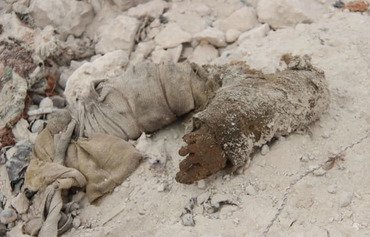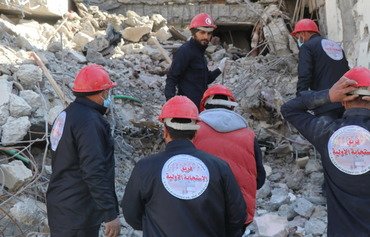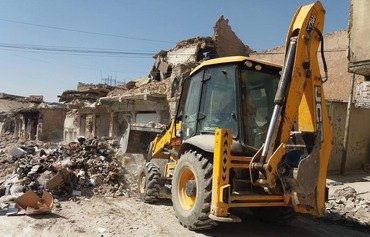Dozens of "Islamic State of Iraq and Syria" (ISIS) corpses remain unburied in west Mosul, creating a health hazard and preventing local residents from returning to their homes and resuming their normal lives.
Hundreds of ISIS fighters were killed as Iraqi forces battled to take back the city in June, and many corpses remain hidden under the rubble or exposed on the banks of the Tigris, health officials and Ninawa's local government told Diyaruna.
"There are real concerns over these corpses spreading many serious diseases as they rot over time," said Ninawa health department director Salah al-Tai.
So far, the health situation in Mosul is under control, he said, but the foul odours emanating from the bodies have put off residents who wish to return and have prevented them from commencing rebuilding efforts.
![Iraqi civil defence personnel retrieve bodies from the rubble in the city of Mosul. [Photo from the Iraqi Civil Defence Facebook page]](/cnmi_di/images/2018/02/15/11288-mosul-isis-corpses2-600_384.jpg)
Iraqi civil defence personnel retrieve bodies from the rubble in the city of Mosul. [Photo from the Iraqi Civil Defence Facebook page]
Removing the corpses
Civil defence teams tasked with removing the bodies of civilians from the rubble officially completed their work on January 10th, AFP reported on January 21st.
But it is the city council's responsibility to remove the bodies of ISIS fighters, some of which still carry undetonated explosives.
"We have already brought 450 out of the rubble, but there are hundreds more," city council head of services Abdel Sattar al-Habbu told AFP.
The health department developed a plan to remove corpses, and has begun removing them, burying hundreds in graveyards outside Mosul, al-Tai told Diyaruna.
But the corpse removal process is facing "huge challenges", he said.
"Many of the corpses under the rubble cannot be reached, and there is a need for heavy machinery, arduous efforts and funding that the health department does not currently have," he said.
The health department asked for help from the province’s municipality department and local government to obtain the necessary equipment and financial resources to complete the task as soon as possible, he said.
The municipal department has moved at least 400 bodies from west Mosul to graveyards outside the city, Ninawa provincial council member Hossam al-Abbar told Diyaruna.
But the department "is unable to continue working in other areas that are more complicated and require heavy equipment that the department does not currently have", he said, calling for federal government support.
Water poisoning concerns
Al-Abbar expressed concern that the corpses, especially those littering the banks of the Tigris, could contaminate the river and the city's drinking water supply.
"The danger is that many of the corpses are currently scattered near the Dandan and Ghazlani [water treatment plants]," he said.
These supply the entire city of Mosul, he said, explaining that if the corpses remain there during rainfall they will pose a real health hazard.
Other threats to the city's environmental and health situation include improvised explosive devices (IEDs), unexploded remnants of war and medical waste and radioactive devices that remain under the rubble of hospitals, he added.
The province has meager resources to tackle the general situation, he said, calling on Baghdad to extend greater support in the upcoming period.
"Civil defence teams play an important role in the removal of the corpses from the west side of Mosul, but they have to deal with the challenge of the narrowness of the streets that prevents the entry of many of their vehicles," said Rabih Ibrahim, a rescue officer at the civil defence department in Mosul.
Civil defence teams also are working to remove all remnants of war and IEDs and to dismantle the explosives left behind by the group, he said.

![In this photo posted online on January 6th, Iraqi civil defence personnel conduct a rescue operation in the city of Mosul. [Photo from the Iraqi Civil Defence Facebook page]](/cnmi_di/images/2018/02/15/11287-Mosul-ISIS-corpses-600_384.jpg)







How did it happen?
Reply1 Comment(s)